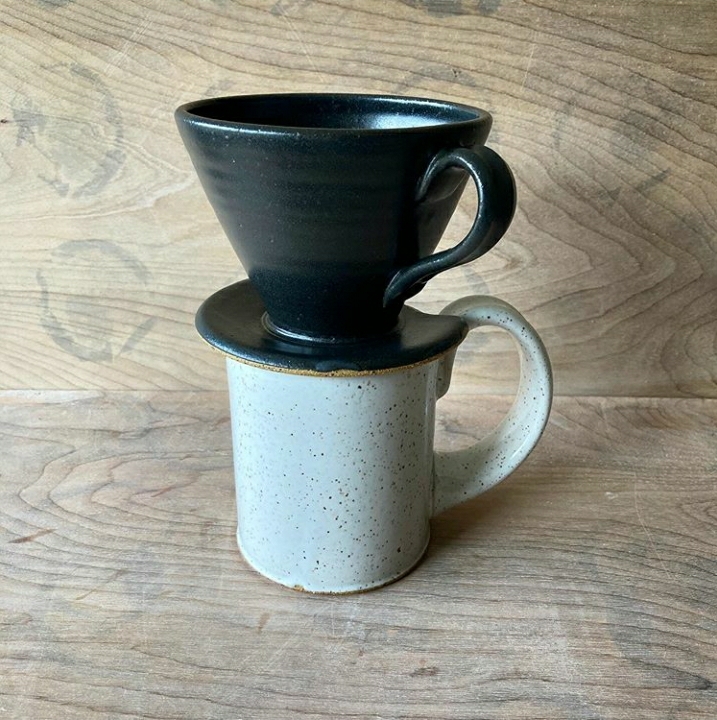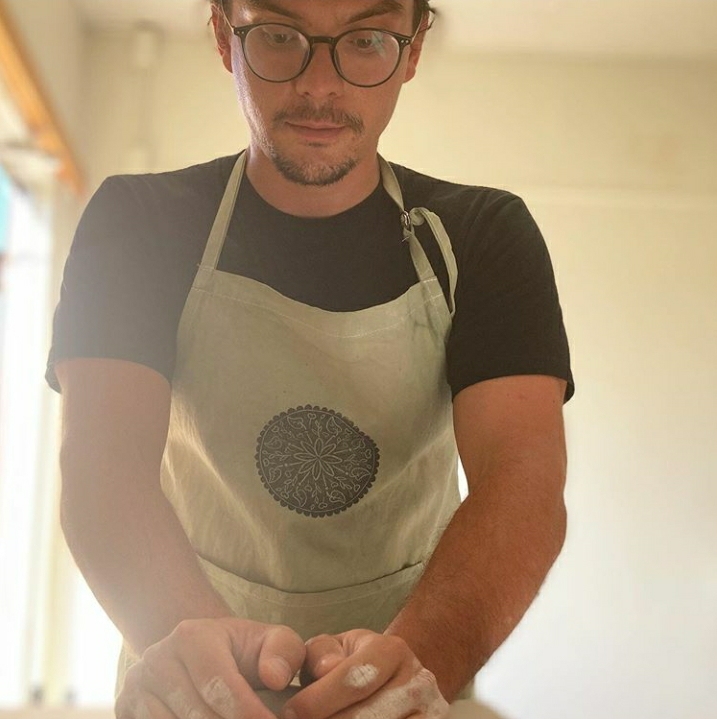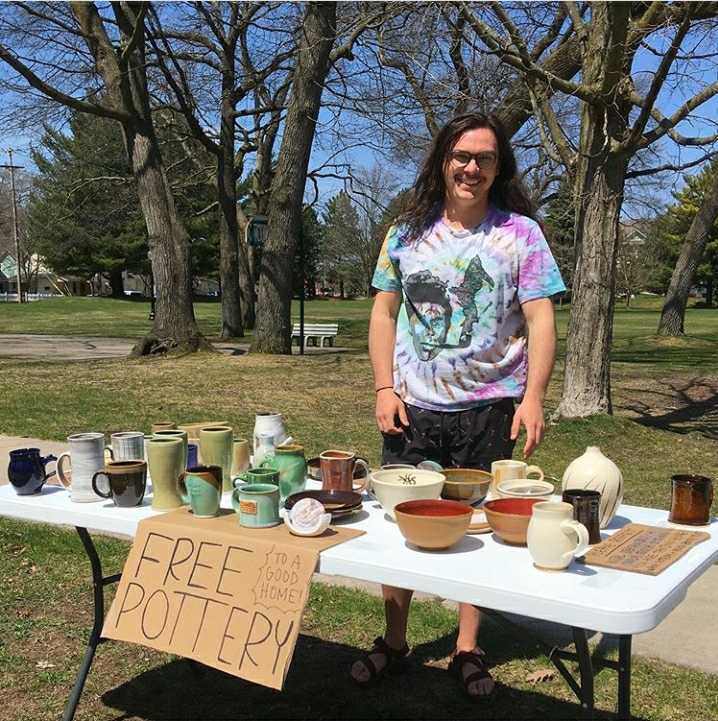




We all have our hobbies, passions and interests that we spend time with. Sometimes if we’re lucky, we can incorporate some of that into our professional work. At a secretary job I used to work, I enjoyed creating flyers for upcoming events and writing the weekly newsletter. It was my little escape from color-coded filing tabs and transferring calls. As you can imagine I enjoy this job quite a bit. Recently, an old friend asked if I had grown resentful of having to write all the time for work. It was a good question. Certainly, my relationship with it has changed but not in a bad way. It’s not a static feeling. It changes day by day, but the love never goes away. On the other side of the coin, it can be easy to think that if you turn your passion into your full-time job, it’s always perfect, and that’s not true either. Local maker Schyler Binkley has turned his passion for making pottery into his full-time job and he goes back and forth on some of the same questions. We sat down with a cup of coffee to talk about his work, and what it’s like to make it such a huge part of his life.
GTP: That’s a nice mug.
SB: “Thanks it just came out of the kiln yesterday.”
GTP: How long does something like that have to sit before you can use it?
SB: “As long as it’s cool enough to touch, it’s good to go. I usually am impatient unloading the kiln. I have to use welding gloves to grab stuff out. It’s like 300 degrees in there. I try to wait as long as I can, but at 300 I’m ready to get out of there.”
GTP: All the cool kids in high school took ceramics. Is that where you got started?
SB: “I took high school ceramics but it was hand-building, so not with a wheel. It’s a way different process with the coil method. You stack the coils up. It was too slow for me. So you’d work on this piece for two weeks, slap on some glaze out of a jar, and then it turns out looking… not at all the way that you wanted. At the time that was not something I was into, but I took a pottery class at college, Western. In 2009 I took my first wheel class and it was just like, man that’s it. The wheel throwing, that is what I was waiting for.”
GTP: What about throwing on a wheel spoke to you more than hand-building?
SB: “If it’s not going well I can just start a new one. And it’s super fast. You can get back to the spot where you screwed up in five minutes, as opposed to however many weeks. I was able to make things that are a little more refined and more round. I think that just kind of clicked for me.”
GTP: How do you make the decision to turn that into full time work?
SB: “After that first wheel class I knew that this is what I was going to do.”
GTP: Did you finish school for it?
SB: “I majored in ceramics and I got a BFA. I mean it’s worthless. The degree is worthless but the education I got through that program is stuff I use all the time.”
GTP: A few months ago you had a table set up F&M park with a bunch of your pottery you were giving away for free?! Why would you do that?
SB: “I have really high standards. So if there’s anything that is messed up, and it’s just like cosmetic stuff, usually with like glaze defaults or defects most of the time where it’s like it’s still a functional piece but I can’t sell it.”
GTP: In your mind you can’t sell it.
SB: “Yeah.”
GTP: So where do the non-rejects go?
SB: “I’ve got a that I sell stuff from, but in regular years I do a lot of shows, art fairs, music festivals, holiday stuff. Last year I did 25 shows. I’ve only been able to set up my booth once this year.”
GTP: Creative is often unstable in more ways than one. Do you ever have any regrets about doing what you love for money?
SB: “Yeah, I think that’s like the artist’s fallacy or something like that, where when people think of what artists do if they’re doing it full time, they’re like, ‘Oh, yeah, you just wander down to the studio whenever you want to and make whatever you want and people just come by and give you money for it.’ I’m doing eight hour days every day like this. Once a year I have this moment where I’m like, do I really want to do this? And so when that happens, I just sit down and I’m like, Is there anything else that I would want to do more than this? Is there anything I can think of that I’d rather do? It’s work. I love it. I love the process. I love what I’m doing. But it’s work for sure.”
GTP: What influences your pottery?
SB: “I feel like I’m in a little bit of a transition right now. For the first several years of doing this, I was into like Japanese aesthetics, wood-fired stuff, which is like, really kind of crusty and natural and Wabi-sabi, a little bit wobbly, you know. Consistency isn’t the focus, or even really the desire, but that’s hard to sell. Something that in the past year or so I’ve been thinking about a lot is how these, how the stuff that I make exists in people’s homes. So I’m really simplifying. I’m really cutting the fat. Simple, simpler colors, simpler surfaces, simpler forms because I don’t know why but I realized at a certain point that these flashy, colorful glazes that I liked so much and that, you know, potters tend to try and use like, just because it’s flashy, it’s hard to get that to work. So that’s where like this white speckled stuff came from. This can be in just about any kitchen or living room or wherever.”
GTP: You do a lot of bulk orders for businesses here in Northern Michigan, do you ever feel like it cuts into time to experiment on your own?
SB: “The thing is I just love the process so much that I don’t mind doing 25 mugs for the brewery down the street. I still really enjoy the process so much that it’s still fun even though it’s just repetition. It hasn’t gone stale.”
GTP: What’s your favorite part of doing what you do?
SB: “Every time I think I’ve got it figured out it ceramics has a way of just breaking your ego and breaking your will. Every time I think I’ve got a perfect whatever, the glaze screws up or this, that and whatever else happens and it’s never ending. But I think that that’s what makes it so compelling, the constant change.
GTP: A little resistance in the face of mastery is good.
SB: “I think so.”
To stay updated on stories like these, join .



© 2023 - 910 Media Group





